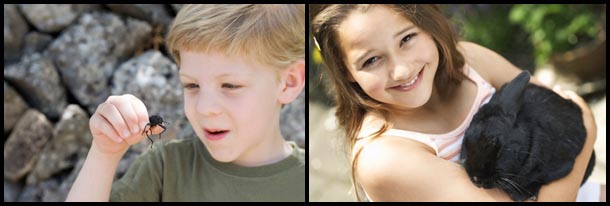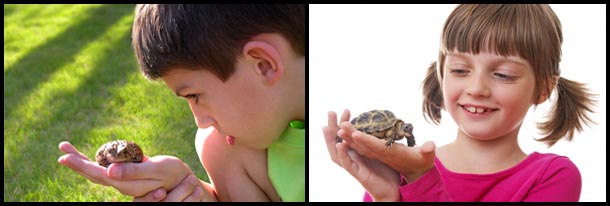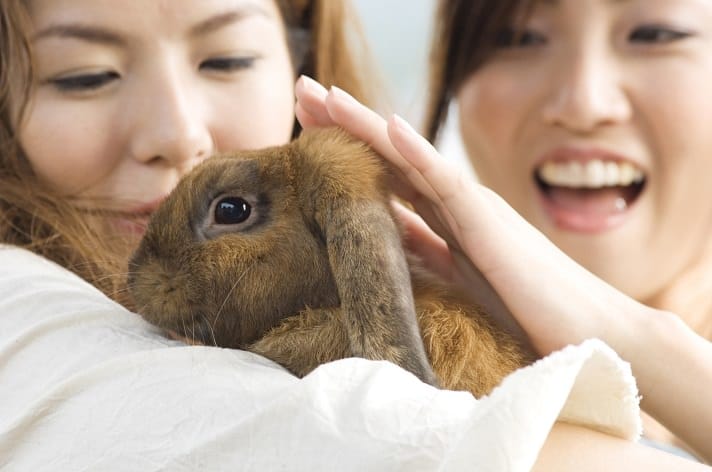Rabbits bite for a range of reasons, which you can usually prevent by being patient and understanding when handling and providing food to your rabbit. Although biting may be worrying or troublesome for you, even well looked after rabbits can occasionally feel nervous or threatened. Here are some reasons why your rabbit may be biting, and how you can stop it.
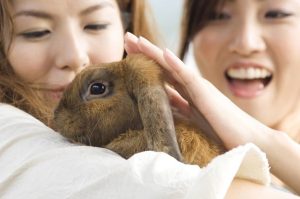
Biting for self-defence
Sometimes, rabbits bite because they feel threatened. This is usually when you come close to your rabbit or while handling it. Typically when rabbits are scared, they will run away or wiggle from your grasp. Sometimes they will bite or snort. This can be if they are cornered in a cage. Mother rabbits may bite out of instinct to defend their nests.
Stopping this: To stop your rabbit from feeling threatened and biting, it is first important that you approach it carefully. When you want to handle your rabbit, you seem less intimidating if you reach from above. Before picking up the rabbit, stroke it gently so it knows you are safe and doesn’t feel scared. If your rabbit has previously bitten when being handled, use a slow, flat palm so the rabbit doesn’t feel restricted.
Biting to protect their cage
Rabbits can become protective of the items inside their cage. They feel safer when their belongings, like their toys and food bowls, are kept in the same place. If you approach their cage, they may feel nervous, and bite or charge. Sometimes, rabbits are protective of their cage if their environment is too small, like their main housing or the space they are given to play in.
Stopping this: If your rabbit bites when you try to clean its cage, first place the rabbit in a safe area they are familiar with to play in. Make sure you handle it carefully when doing this, and have someone watch the rabbit while you are cleaning to make sure it is safe. After you clean, place the rabbits belongings in the same place they were before. This makes the cage nice and familiar.
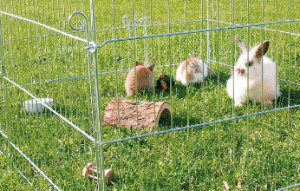
Biting to protect their food
In the wild, rabbits defend their food since they have to gather it themselves. Even though you provide your rabbit with lots of food often, it may still feel as though food must be protected. This causes the rabbit to bite.
Stopping this: If your rabbit is very protective of its food bowl, try moving the food bowl to a different spot in its cage each day. This will stop the rabbit from becoming attached to its food storage spot and being territorial. You can also stop using a food bowl all together, and just spread the rabbits pellets throughout the cage.
Other factors
Homones: Your rabbit may be aggressive because of hormones, especially if your rabbit is male. This can be resolved by spaying or neutering the rabbit.
Illness: If your rabbit is being unusually aggressive, you may benefit from taking it to the vet. Your vet can check for dental issues or joint pain that could be increasing the irritability of your rabbit. You can also perform some heath checks from home.
Responding to biting
If your rabbit bites you, its important that your rabbit learns that this is bad behaviour. Give a loud squeak when they bite you- even if it didn’t really hurt. Never physically discipline your rabbit- they will just become scared of you and may bite out of self-defence. When your rabbit stops biting or being aggressive, give them a gentle and loving pat. Over time, your rabbit will learn that they are rewarded for good behaviour, and will stop biting.
Animal-Club provides animal parties or animal handling workshop where your will be able to see, learn and interact with the hamsters and other wonderful animals with the help of our presenters. Our mobile zoo has many friendly animals such as rabbits, tarantulas, geckos, vinegaroons and more that will be perfect for an animal party. We can also come over to your school for an animal school visit or arrange for an animal workshop with us where the children can learn about animals and have fun too.
